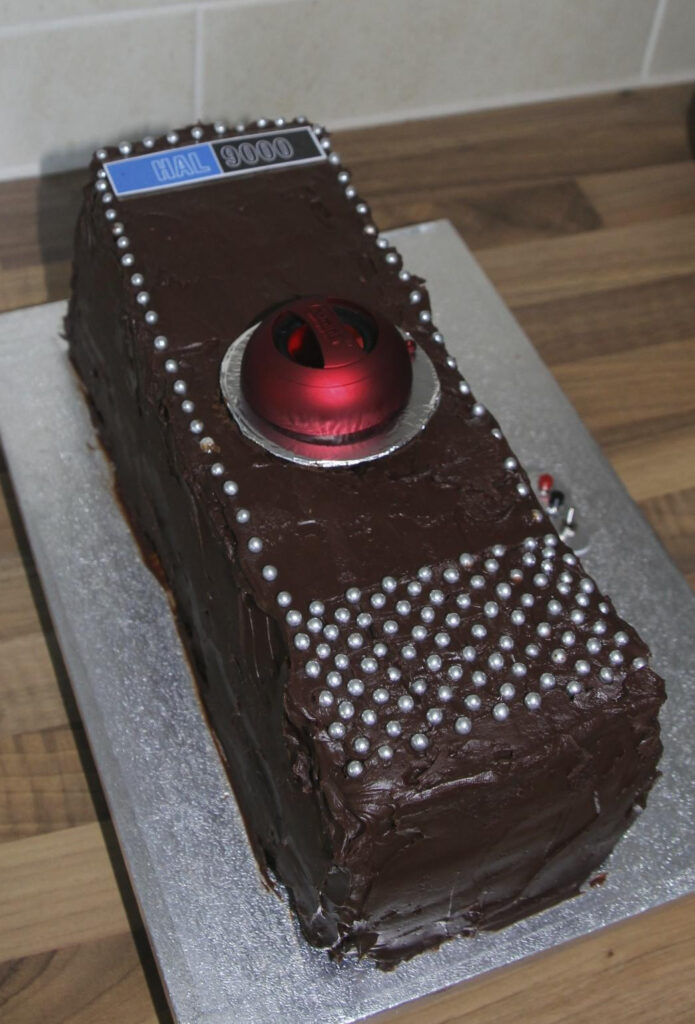Where it all began… A space themed cake competition at work ended up getting a little out of hand when I decided to add some sound effects to my cake.
The Cake
This was a delicious chocolate and caramel overload with three tiers of cake sandwiched with caramel and covered in a thick layer of ganache! See this separate post for the recipe.

The Tron
The iconic red eye of the HAL 9000 was represented by a speaker, connected to an arduino equipped with a “waveshield” capable of playing audio files from an SD card.
At the push of a button the iconic “Also sprach Zarathustra” theme from 2001: A Space Oddessy would play, while another button triggered a series of quotes from the film.
All of the electronics and batteries were concealed under a cakeboard on top of an A4 picture frame, with a few controls exposed on the top.
Arduino Setup
The waveshield arrived in a kit form, so required a moderate amount of soldering. It came with good instructions and examples so once assembled I was able to get it up and running pretty quickly.
Arduino Code
#include <FatReader.h>
#include <SdReader.h>
#include <avr/pgmspace.h>
#include "WaveUtil.h"
#include "WaveHC.h"
SdReader card; // This object holds the information for the card
FatVolume vol; // This holds the information for the partition on the card
FatReader root; // This holds the information for the filesystem on the card
FatReader f; // This holds the information for the file we're play
WaveHC wave; // This is the only wave (audio) object, since we will only play one at a time
#define DEBOUNCE 100 // button debouncer
byte WavToPlay;
// this handy function will return the number of bytes currently free in RAM, great for debugging!
int freeRam(void)
{
extern int __bss_end;
extern int *__brkval;
int free_memory;
if((int)__brkval == 0) {
free_memory = ((int)&free_memory) - ((int)&__bss_end);
}
else {
free_memory = ((int)&free_memory) - ((int)__brkval);
}
return free_memory;
}
void sdErrorCheck(void)
{
if (!card.errorCode()) return;
putstring("\n\rSD I/O error: ");
Serial.print(card.errorCode(), HEX);
putstring(", ");
Serial.println(card.errorData(), HEX);
while(1);
}
void setup() {
// set up serial port
Serial.begin(9600);
putstring_nl("WaveHC with 6 buttons");
putstring("Free RAM: "); // This can help with debugging, running out of RAM is bad
Serial.println(freeRam()); // if this is under 150 bytes it may spell trouble!
// Set the output pins for the DAC control. This pins are defined in the library
pinMode(2, OUTPUT);
pinMode(3, OUTPUT);
pinMode(4, OUTPUT);
pinMode(5, OUTPUT);
// pin13 LED
pinMode(13, OUTPUT);
// enable pull-up resistors on switch pins (analog inputs)
digitalWrite(14, HIGH);
digitalWrite(15, HIGH);
digitalWrite(16, HIGH);
digitalWrite(17, HIGH);
digitalWrite(18, HIGH);
digitalWrite(19, HIGH);
WavToPlay = 0;
// if (!card.init(true)) { //play with 4 MHz spi if 8MHz isn't working for you
if (!card.init()) { //play with 8 MHz spi (default faster!)
putstring_nl("Card init. failed!"); // Something went wrong, lets print out why
sdErrorCheck();
while(1); // then 'halt' - do nothing!
}
// enable optimize read - some cards may timeout. Disable if you're having problems
card.partialBlockRead(true);
// Now we will look for a FAT partition!
uint8_t part;
for (part = 0; part < 5; part++) { // we have up to 5 slots to look in
if (vol.init(card, part))
break; // we found one, lets bail
}
if (part == 5) { // if we ended up not finding one :(
putstring_nl("No valid FAT partition!");
sdErrorCheck(); // Something went wrong, lets print out why
while(1); // then 'halt' - do nothing!
}
// Lets tell the user about what we found
putstring("Using partition ");
Serial.print(part, DEC);
putstring(", type is FAT");
Serial.println(vol.fatType(),DEC); // FAT16 or FAT32?
// Try to open the root directory
if (!root.openRoot(vol)) {
putstring_nl("Can't open root dir!"); // Something went wrong,
while(1); // then 'halt' - do nothing!
}
// Whew! We got past the tough parts.
putstring_nl("Ready!");
}
void loop() {
//putstring("."); // uncomment this to see if the loop isnt running
switch (check_switches()) {
case 1:
playfile("ALSO.WAV");
break;
case 2:
WavToPlay = WavToPlay+1;
if(WavToPlay > 8) {
WavToPlay = 1;
}
switch (WavToPlay) {
case 1:
playcomplete("SORRY1.WAV");
break;
case 2:
playcomplete("HAL9000.WAV");
break;
case 3:
playcomplete("DISCON.WAV");
break;
case 4:
playcomplete("GOODEVE.WAV");
break;
case 5:
playcomplete("FEEL.WAV");
break;
case 6:
playcomplete("SORRY2.WAV");
break;
case 7:
playcomplete("STRESS.WAV");
break;
case 8:
playcomplete("GOODBYE.WAV");
}
break;
case 3:
wave.stop();
}
}
byte check_switches()
{
static byte previous[6];
static long time[6];
byte reading;
byte pressed;
byte index;
pressed = 0;
for (byte index = 0; index < 6; ++index) {
reading = digitalRead(14 + index);
if (reading == LOW && previous[index] == HIGH && millis() - time[index] > DEBOUNCE)
{
// switch pressed
time[index] = millis();
pressed = index + 1;
break;
}
previous[index] = reading;
}
// return switch number (1 - 6)
return (pressed);
}
// Plays a full file from beginning to end with no pause.
void playcomplete(char *name) {
// call our helper to find and play this name
playfile(name);
while (wave.isplaying) {
// do nothing while its playing
}
// now its done playing
}
void playfile(char *name) {
// see if the wave object is currently doing something
if (wave.isplaying) {// already playing something, so stop it!
wave.stop(); // stop it
}
// look in the root directory and open the file
if (!f.open(root, name)) {
putstring("Couldn't open file "); Serial.print(name); return;
}
// OK read the file and turn it into a wave object
if (!wave.create(f)) {
putstring_nl("Not a valid WAV"); return;
}
// ok time to play! start playback
wave.play();
}
